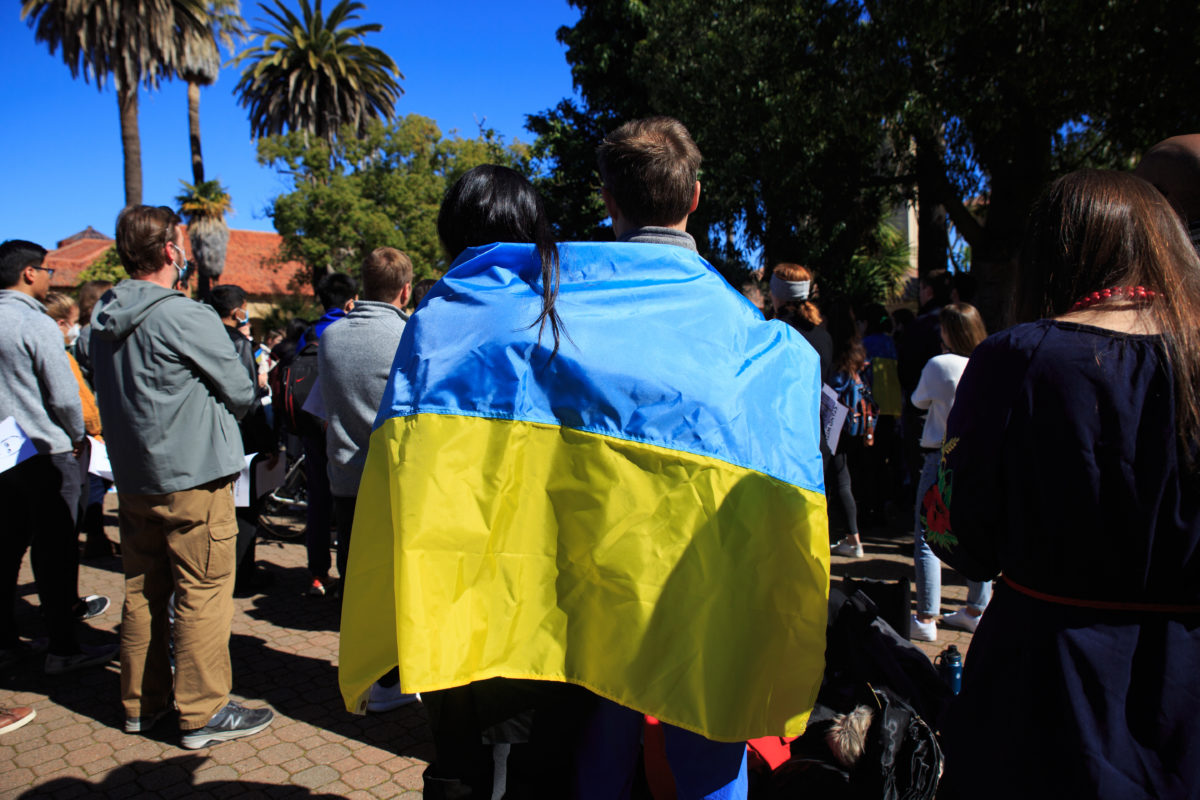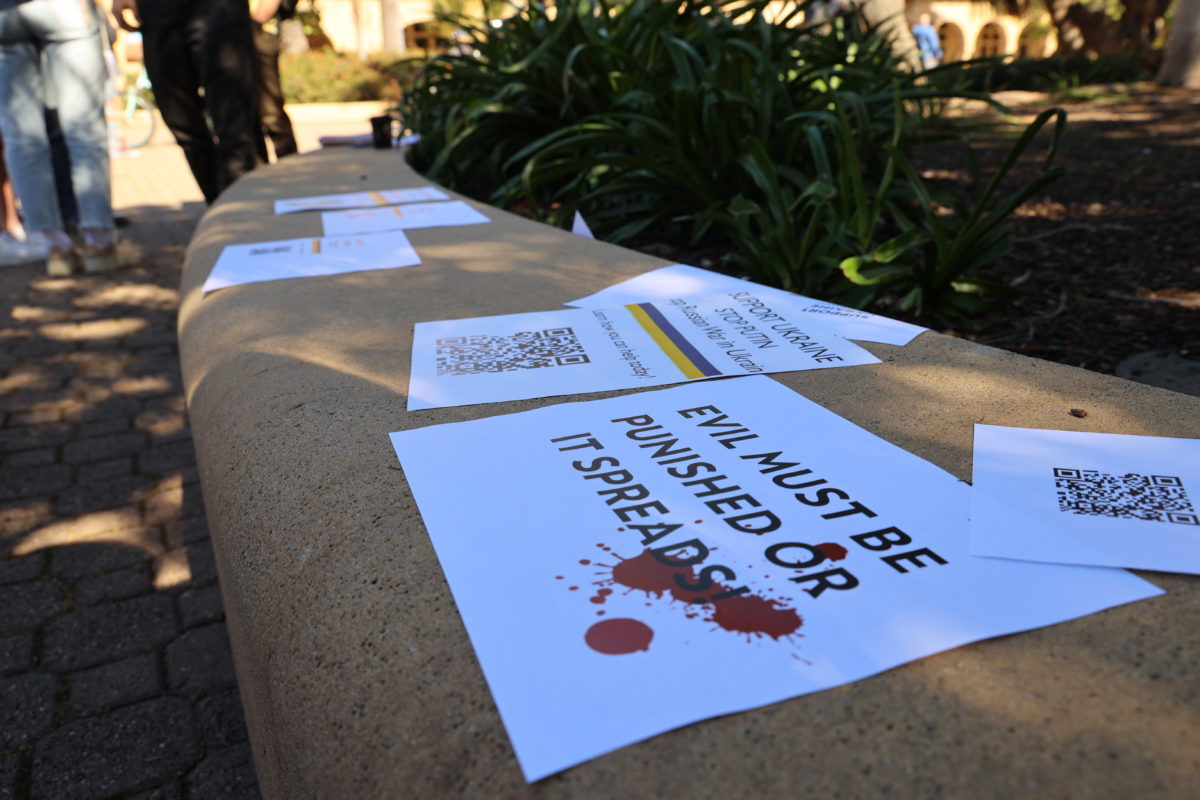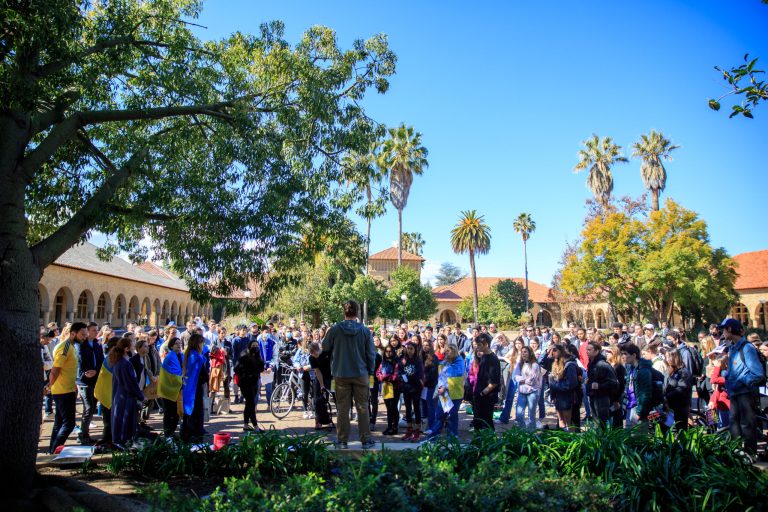A crowd of approximately 60 community members gathered at Main Quad on Thursday to condemn Russia’s invasion of Ukraine and stand in solidarity with the Ukrainian people. Starting at noon and lasting for one hour, the rally, which was organized by Stanford students, took place in front of Memorial Church, where attendees shared embraces, words of solace and calls to action.
On Wednesday night, Russia launched an invasion of Ukraine, unleashing airstrikes on military bases and major cities including Kyiv, Ukraine’s capital, and Kharkiv. Just hours later, Ukrainian students at Stanford came together to organize the rally, drawing students from all backgrounds to participate in support of Ukraine. Some attendees spoke about their families currently living in the country and the fear incited by Russia’s decision to invade.
“This is not how I would’ve imagined to address a crowd of this size, but unfortunately, this is what we are dealing with today,” said Kate Slunkova MBA ’22, a dual-degree graduate student born and raised in Dnipro, Ukraine.
Student organizers partnered with fellows from the Ukrainian Emerging Leadership Program (UELP), a 10-month academic training program hosted by Stanford, to facilitate the event. UELP was founded in 2016 to address challenges in Ukraine and the surrounding region.
Catarina Buchatskiy ’24, a native of Kyiv and one of the protest’s lead organizers, explained that students wanted to mobilize rapidly after Wednesday’s attacks to demonstrate their support and do whatever was necessary before the war escalates further. She emphasized the significance of students organizing at universities like Stanford, “a place that is highly respected for its intelligence and educational standard.”
“Putin is not just targeting Ukraine’s borders and the geographical territory but Ukraine’s very history and culture,” Buchatskiy told The Daily after the rally. “I think that at Stanford, especially, it’s important to realize that. Whatever happens next, I think it’s important to remember this moment in time, that this is not Ukraine’s history and that we have our own conception and our own sovereignty.”
“Saying this now in a place that fosters education before any Russian propaganda can do further damage is important,” Buchatskiy added.

Andrii Torchylo ’25, whose family lives in Ukraine, shared with the crowd the moment he found out about Wednesday night’s Russian invasion: “Why is this happening to me? Why is this happening to my family and every single Ukrainian?” he asked. “Because we chose to be a democratic nation.”
Torchylo urged attendees and anyone who holds democratic values to remember that “this is not just a war against Ukraine” but against international democracy.
Fellow protestors echoed Torchylo’s sentiment throughout the gathering, emphasizing that the invasion is ultimately “a war on democracy in the entire world.”
Some protestors draped Ukrainian flags over their shoulders, while others wore clothing in the flag’s colors of blue and yellow. To conclude the rally, participants joined in singing the Ukrainian National Anthem.
In the hour following the rally’s scheduled conclusion, student organizers handed out flyers with messages ranging from “Support Ukraine = Save Democracy in the World” to “Evil must be punished or it spreads” and “Stop Putin. Stop War.”

Yulia Bezvershenko, a visiting UELP scholar and the former Director General of the Directorate of Science and Innovation in the Ministry of Education and Science of Ukraine, said that Stanford holds an influential place in the United States, serving as a hub for scholarship from around the world.
Bezvershenko said that she plans to share photos and videos from the rally with people in Ukraine to show them that the international community is joined in their fight.
“Every person here can reach friends, relatives, professors, Congressmen and tell the truth,” Bezvershenko said. “Things in Ukraine are developing very quickly. People are fighting. People will resist until the last drop of blood but people need weapons, people need support [of] any type.”
Organizers also scattered flyers across the area with a QR code linked to a document titled “#StandWithUkraine @ Stanford” which includes information about Ukrainian organizations accepting donations and actions students can take to support the Ukrainian people.
But while financial and physical support from the international community remains important, the spread of misinformation around the world about Ukraine is a threat “just as big as the missiles that strike our cities,” one protestor said.
Slunkova took the mic to urge allies to step out of private message boards and be vocal about their support.
“Next time you’re thinking about texting your Ukrainian friends, if they are here, they are fine. We are safe.” Slunkova said. “But, we want to make sure that this message about ‘not being fine with violence and invasion’ is spread wider, not in a private space, but in public.”
